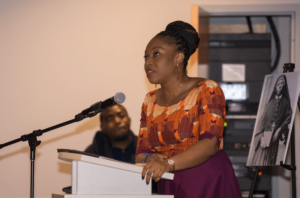by The Cowl Editor on April 19, 2018
News
by Alexandra Huzyk ’20
News Staff

In between visits to Washington, D.C., and the Canadian Parliament, Obianuju Ekeocha, a Nigerian social and political activist, gave a talk to the Providence College community titled “Neocolonialism in Africa: Repeating the Past, but Worse.” Ekeocha talked about the ideological neocolonialism that donors use in their funding strategies within Africa.
Ekeocha began the lecture by providing brief demographic and historical context of Africa as a continent. Africa is composed of 54 countries and is home to one billion people, with around 3,000 native languages spoken. Ekeocha said that although there are many different tribes and ethnic groups and no one true African culture, “there are common threads that run through the various African countries.”
Ekeocha also explained that colonialism in Africa began at the Berlin Conference, which took place in 1884. This conference is known as the “Scramble for Africa.” At the Berlin Conference, the European powers of the 19th century divided up African land for colonization. Ekeocha said, “Great Britain was the greatest colonial power, as well as France.”
This period of colonization, which lasted between 70 and 75 years, “was really about geopolitical domination.” In the 1960s, African countries were granted their independence from their respective European colonists. Ekeocha explained that since then, Africa has developed various problems in the areas of economy, politics, security, infrastructure, development, and healthcare. As a result of these struggles, donors come in to give money and resources. Some countries, Ekeocha says, “are addicted to the foreign aid and the opulence that the donors have to give.”
Ekeocha also explained that this relationship between donor and country creates a power imbalance. The African countries believe that the donors are coming in as friends and as equals, which is not the case. “They are coming with very clear definitions and views of the world that are not necessarily ours,” Ekeocha said. “They define for us what is human life and what are human rights.”
Donors also determine what is worth funding, without necessarily considering the real problems at hand or the input of citizens. Ekeocha said, “Donors are completely blind and deaf to everything that we hold dear,” including rich African culture. When countries do not comply, leaders are shamed and punished.
To elaborate on this power imbalance, Ekeocha revealed that a startling amount of funds are given to what are called population programmes. “This includes all aspects of sexual reproductive health and rights [SRHR] like contraceptives, condoms, comprehensive sexuality education, and abortion,” Ekeocha shared. She also explained that most of the funding that is given to these population programmes pays for expensive billboards and contraceptives which have debilitating side effects.
After, Ekeocha showed the audience graphs depicting the percentages of aid from the U.S. and the UK which are allocated to SRHR; 31.4 percent and 43.8 percent, respectively. In comparison to the funds given to population programmes in all other areas of the world, Africa receives much more in this particular sector. “This is exactly what I would define as phenotropic racism,” said Ekeocha.
Funding for population programs also goes towards providing resources for abortion and advocacy. “In Africa there are only 4 countries that have legalized abortion and those are south Africa, Tunisia, Cape Verde, and Mozambique,” Ekeocha said. Countries have the legal capacities to legalize abortion, but oftentimes choose not to because it conflicts with the public’s opinions. “There is that strong protective instinct in Africans,” she said, which can be reflected in one’s feelings regarding abortion.
Ekeocha emphasized the fact that women are speaking out, and yet donors continue to ignore their thoughts and cultural beliefs. In this way, Ekeocha says, “Our donor has become our master,” for their donors foster a sense of paternalism and contribute to ideological neocolonialism.
The lecture concluded with a sneak peek of a documentary that Ekeocha is working on named Strings Attached.